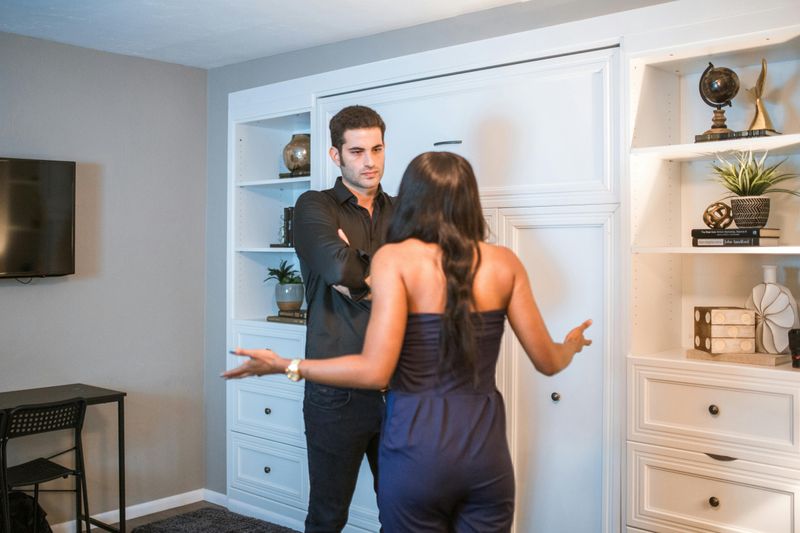Moving in with your partner marks a huge step in your relationship. Beyond the excitement of sharing a space, it brings real-world challenges many couples don’t think about until they’re knee-deep in disagreements. Before you start packing boxes and browsing furniture catalogs, make sure you’ve had some honest conversations about these often-overlooked questions.
1. How will we handle money secrets?

Financial skeletons have a way of tumbling out of the closet once you share an address. Credit card debt, spending habits, and savings goals suddenly become shared business. Many couples move in together without ever discussing their complete financial picture.
Talk openly about your credit scores, debt load, and any money habits you might be embarrassed about. This conversation might feel awkward now, but it’s much easier than discovering your partner has $30,000 in hidden debt after you’ve signed a lease together.
Create a judgment-free zone where both of you can lay out your financial reality – good and bad. This transparency builds trust and prevents nasty surprises down the road.
2. What happens to our living space during arguments?

When you can’t just walk away to your own space after a fight, arguments hit differently. Sharing only 800 square feet with someone you’re angry at makes even the tiniest disagreement feel overwhelming.
Discuss how you’ll handle cooling-off periods during fights. Will one person take a walk? Do you need a designated “time-out” space in your home? Some couples establish ground rules like never going to bed angry or setting a 30-minute limit on heated discussions.
Having a conflict management plan prevents the awkward dance of avoiding each other in a shared space and keeps your home feeling like a safe haven, not a battlefield.
3. How compatible are our sleep habits?

Few couples talk about sleep compatibility before moving in together, yet it impacts daily life more than you’d think. Whether you’re a night owl or an early bird, a snorer or a light sleeper, these differences can fuel sleepless nights and growing resentment.
Try a sleep compatibility test-run before committing to cohabitation. Spend consecutive nights together under normal conditions (not just weekend sleepovers). Pay attention to temperature preferences, noise sensitivity, and sleep/wake schedules.
Solutions might include earplugs, separate blankets, or even separate bedrooms for some couples. Don’t dismiss sleep incompatibility as minor – quality rest directly impacts your mood, health, and relationship satisfaction.
4. Who gets custody of the apartment if we break up?

Nobody likes thinking about breakups while planning to move in together. Yet having an exit strategy prevents a bad situation from becoming worse. Breakup logistics get complicated when you share a lease, furniture, and possibly pets.
Have a straightforward conversation about what happens if things don’t work out. Who would move out? How would you divide shared purchases? Would one person buy the other out of the security deposit?
Consider creating a simple cohabitation agreement outlining these details. This isn’t pessimistic – it’s practical planning that shows you both respect each other enough to handle potential difficulties with maturity.
5. Can we survive each other’s annoying habits?

Those cute quirks you overlook during dating can become major irritants when you’re exposed to them daily. The cap left off the toothpaste, dishes piled in the sink, or loud phone conversations might seem trivial now but can spark genuine frustration over time.
Before moving in, each of you should honestly list your potentially annoying habits. Maybe you leave wet towels on the bed, or they turn the TV volume way up. Discussing these openly helps set expectations and boundaries.
Remember that successful cohabitation isn’t about finding someone with no annoying habits – it’s about finding someone whose habits you can tolerate and who respects your boundaries enough to compromise.
6. How will we balance alone time and togetherness?

Moving in doesn’t mean you should spend every free minute side by side. Healthy relationships depend on balancing closeness with personal space, or resentment will quickly take hold.
Discuss your needs for solitude honestly. Are you someone who recharges with quiet reading time? Do they need weekend mornings alone? Map out how you’ll respect each other’s alone time without feeling rejected.
Consider designating certain areas or times for individual activities. Some couples establish weekly “me time” where each person pursues separate interests. Finding this balance early prevents the common pattern of togetherness overload followed by relationship burnout.
7. What’s our plan for dividing invisible labor?

Beyond cleaning and cooking, household work includes invisible tasks like tracking birthdays, coordinating schedules, and emotional upkeep. When these fall mostly on one person, hidden resentment starts to fester.
Before cohabiting, list ALL household responsibilities, including the less visible ones. Who notices when you’re low on toilet paper? Who remembers maintenance schedules? Who plans meals?
Fair division doesn’t always mean 50/50 on each task. Maybe one person handles laundry while the other manages finances. The key is acknowledging all forms of household labor and creating a system where neither person feels their contributions go unnoticed or unappreciated.

Comments
Loading…